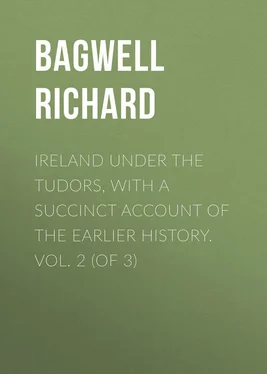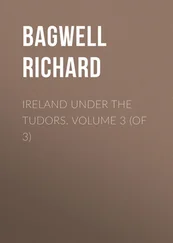Richard Bagwell - Ireland under the Tudors, with a Succinct Account of the Earlier History. Vol. 2 (of 3)
Здесь есть возможность читать онлайн «Richard Bagwell - Ireland under the Tudors, with a Succinct Account of the Earlier History. Vol. 2 (of 3)» — ознакомительный отрывок электронной книги совершенно бесплатно, а после прочтения отрывка купить полную версию. В некоторых случаях можно слушать аудио, скачать через торрент в формате fb2 и присутствует краткое содержание. Жанр: foreign_antique, foreign_prose, Историческая проза, на английском языке. Описание произведения, (предисловие) а так же отзывы посетителей доступны на портале библиотеки ЛибКат.
- Название:Ireland under the Tudors, with a Succinct Account of the Earlier History. Vol. 2 (of 3)
- Автор:
- Жанр:
- Год:неизвестен
- ISBN:нет данных
- Рейтинг книги:4 / 5. Голосов: 1
-
Избранное:Добавить в избранное
- Отзывы:
-
Ваша оценка:
- 80
- 1
- 2
- 3
- 4
- 5
Ireland under the Tudors, with a Succinct Account of the Earlier History. Vol. 2 (of 3): краткое содержание, описание и аннотация
Предлагаем к чтению аннотацию, описание, краткое содержание или предисловие (зависит от того, что написал сам автор книги «Ireland under the Tudors, with a Succinct Account of the Earlier History. Vol. 2 (of 3)»). Если вы не нашли необходимую информацию о книге — напишите в комментариях, мы постараемся отыскать её.
Ireland under the Tudors, with a Succinct Account of the Earlier History. Vol. 2 (of 3) — читать онлайн ознакомительный отрывок
Ниже представлен текст книги, разбитый по страницам. Система сохранения места последней прочитанной страницы, позволяет с удобством читать онлайн бесплатно книгу «Ireland under the Tudors, with a Succinct Account of the Earlier History. Vol. 2 (of 3)», без необходимости каждый раз заново искать на чём Вы остановились. Поставьте закладку, и сможете в любой момент перейти на страницу, на которой закончили чтение.
Интервал:
Закладка:
Fitzwilliam took a very gloomy view of the country committed to his charge. He was, he said, a banished man wearing himself out among unkind people, a people most accursed, who lusted after every sin. Murder and incest were everyday matters, and a lying spirit brooded over all the land. It was difficult to make out any man’s pedigree or title; for heraldry was discountenanced, records destroyed or embezzled, and everyone greedy for the reputation conferred by rhymers, whose trade was to set forth ‘the most beastliest and odious parts of men’s doings and their own likewise, for whom the rhymes be made; such be cherished, defended, and rewarded with garments till they leave themselves naked, besides the best piece of plate in the house, and chiefest horse away with them, not altogether departing empty-handed when they come among the Earls and others the nobility of English race.’ The English Pale was, indeed, in a dreadful state, every one prophesying a total change of policy, and refusing to obey any law. Pirates infested the sea, blockading Cork and Kinsale, and even lying openly under Lambay, while the Queen’s ships were nowhere visible. Robbery and arson were commonly committed with impunity. Thus Richard Keating, whose family had for generations given their service as swordsmen to the Earls of Kildare, amassed great wealth by preying on the property of the English settlers in Wexford. No one exerted himself to make the Keatings disgorge their ill-gotten gains, fearing the vengeance of their great patron, and even Ormonde was unwilling to press them hard. ‘There be such with us,’ said Fitzwilliam, ‘as can serve two masters, and neither truly.’ 48 48 Fitzwilliam to Cecil, April 14 and 29; Lord Justice and Council to the Queen, April 17.
Most important families had friends in official circles, and among the lawyers the jobbing was frightful. Records were made away with or altered, so that of seven attainders affecting the Crown’s title to land, not one could be proved by documentary evidence. The judges were not above suspicion, and public justice had little chance against well-connected individuals. ‘There is,’ said the Lord Justice, ‘neither judge, counsellor-at-law, nor any gentleman who is not by blood or marriage very near linked together, and though I cannot accuse any for doing things contrary to their conscience or corruptly, yet have I seen such things pass, whether for kindred’s sake or neighbourhood I know not, but sure I am no man out of Ireland in the like case but would have made some stay for colour sake at least.’ Where private interests were to be forwarded, decisions were given with indecent haste, while Crown business was systematically delayed. Fitzwilliam saw and described abuses clearly, but he had too much experience of Ireland to dream of a speedy reform. He had come with sanguine expectations, but had learned that a man may wear to skin and bones without effecting anything. The English Government had aggravated the difficulty by sending over officials of small parts or credit, far inferior to those born in Ireland. ‘Let those sent hereafter,’ he said, ‘be as good as the best here,’ and let ‘every one that comes bid farewell to peace and quiet.’ 49 49 Fitzwilliam to Cecil, May 13, with the enclosures; Matthew King to Cecil, May 7. King was Clerk of the Check, and of course saw a good deal.
CHAPTER XXI.
1561 TO 1564
Queen Elizabeth might show clemency or policy by her treatment of Shane O’Neill, by ignoring Kildare’s intrigues and utilising him in her service, and by summoning Desmond and Ormonde to submit their controversies to her personal arbitrament; but she could not close her ears to the complaints which reached her as to the state of the English Pale. It was then, as it still is, the custom for Irish students to keep some terms in London, to study the common law at head-quarters, and to carry back legal traditions and modes of thought to their own country. The bar was the recognised road to power and influence, and young men of family chose it almost as a matter of course. Twenty-seven of these students signed a memorial specifying the miserable state of the Pale, and this document was delivered to the Privy Council. Among the names of the signataries we find Talbot, Bathe, Dillon, Barnewall, Burnell, Fleming, Netterville, Wesley, or Wellesley, and others scarcely less known. The complaints were arranged under twenty-four heads, and interrogatories were delivered to Sussex, who made the best answer he could to each. The first article set forth that the whole expense of the Government and forts was nominally borne by Dublin, Kildare, Meath, West Meath, and Louth; but that West Meath and Louth hardly paid anything, and that the real weight rested on the three first only. To this it was answered that Carlow and Wexford were contributory, and that there was also some help derived from Irish countries: poverty there might be, but not caused by the soldiers; otherwise why should West Meath, where there were seldom any troops, be the least peaceful county of all? The rejoinder was that Wexford and Carlow sometimes paid a trifle under protest, that the Lord Deputy sometimes lived at Leighlin Bridge, with the express object of getting something out of the country irregularly, and that West Meath suffered from Irish exactions, to which the Marshal and Cowley, the Governor of Philipstown, were parties. Forced labour for insufficient pay, free quarters for soldiers, goods taken far below the market price, coyne and livery, private jobbing under colour of the public service – such were the principal heads under which the law students arranged their heavy indictment. No doubt there was exaggeration, and in some cases Sussex was able to give a conclusive answer; but the students admitted that writing at a distance they made no claim to infallibility, and craved indulgence for mistakes, preferring to incur blame rather ‘than that the miserable estate of our poor country should not be known to our gracious Queen.’ They courted the fullest inquiry, and they certainly made a case strong enough to startle a sovereign who could never be justly accused of neglecting her subjects’ welfare. Lord Robert Dudley, glad no doubt of an opportunity to annoy Sussex, and perhaps supplied with information by Sidney, supported the students; but the general official voice was loud and confident against them, and a rumour reached Ireland that the Queen gave no heed to their complaints. Thereupon twenty-seven gentlemen of the Pale addressed Elizabeth directly, supporting the original charges, protesting that their poverty and not their will made them impatient of taxation, and confiding in the Queen’s readiness to learn the misery of her subjects, ‘yea, from the basest sort.’ They demanded an independent commission of inquiry, and begged that their interests might be represented by Lord Baltinglass and John Parker, Master of the Rolls in Ireland, himself an Englishman, but a bitter critic of Sussex and his government, and in their estimation a just and upright man. 50 50 Book by twenty-seven students of Ireland, March 21, 1562, and the documents arising out of it (52 to 59). Sir Oliver Plunket, of Rathmore, and twenty-six others to the Queen, May 27, and their letter of the same date to Lord R. Dudley.
One complaint of the students deserves special mention. They alleged that martial law interfered with the regular tribunals, and being pressed for particulars they stated positively ‘that Sir Ralph Bagenal, being lieutenant of the army, was for killing of a soldier arraigned at the King’s Bench, who pleaded his pardon. Whether justice hath been done by the Marshal of soldiers complained on to that we say that the man before mentioned to have been arraigned at the King’s Bench, and attempted to be taken thence by the Marshal, but upon resistance of the judges stayed and committed to gaol, was after by the Marshal taken from thence, and had none other punishment than put on the pillory, muffled, as it should seem, lest he might be known, which we count rather a mockery than execution of justice.’ No answer in effect was given to this heavy charge, but that the Marshal had authority over the military, and that the Governor had orders to maintain him. If the lawyers in Dublin were guilty of factious opposition to the Government, they were not altogether without excuse. 51 51 Interrogatories by the Earl of Sussex, &c., March 21, and the answer, same date.
Интервал:
Закладка:
Похожие книги на «Ireland under the Tudors, with a Succinct Account of the Earlier History. Vol. 2 (of 3)»
Представляем Вашему вниманию похожие книги на «Ireland under the Tudors, with a Succinct Account of the Earlier History. Vol. 2 (of 3)» списком для выбора. Мы отобрали схожую по названию и смыслу литературу в надежде предоставить читателям больше вариантов отыскать новые, интересные, ещё непрочитанные произведения.
Обсуждение, отзывы о книге «Ireland under the Tudors, with a Succinct Account of the Earlier History. Vol. 2 (of 3)» и просто собственные мнения читателей. Оставьте ваши комментарии, напишите, что Вы думаете о произведении, его смысле или главных героях. Укажите что конкретно понравилось, а что нет, и почему Вы так считаете.












